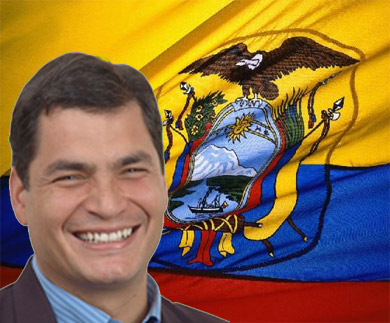A few weeks ago the ABC newspaper in Spain headlined the imminent death of Hugo Chavez Frias. And today, 24th of January, after the El Pais newspaper published a picture of him intubated on its front page it had to rapidly change it explaining that it wasn’t a photo of the Venezuelan leader or even a recent photo, instead coming from a video on youtube in 2008.
The animosity of Spaniards towards the President of Venezuela has a history. Back in 2002 when a coup d’etat removed Chavez from the Miraflores Palace for less than 48 hours, vested interested back in the Iberian Peninsula had a lot to do with it. Even José María Aznar, the Prime Minister of Spain at the time, was accused of being an instigator.
When, during the Ibero-American Summit, the Spanish King, Juan Carlos I, lost his patience and told Chavez to shut up, at the time Chavez was denouncing the persecution and intrigues carried out against him—or rather against the Venezuelan people—by Spanish politicians, businesses and the Crown.
But Iberians don’t oppose Chavez because of ideological interests, but rather because in the background there is a struggle for power. The media has become the Court of the doctrine of global corporate power, distracting or distorting reality to favour their monopolistic interests. Venezuela faced this power and continues fighting against the information blockade that exists in the country and in the planet: something that his Majesty needs to be silenced.
Another loudmouth
Rafael Correa is another loudmouth, another candidate for the silent treatment. The media back on the peninsula defames and misrepresents Ecuadorian reality, the same as they do with Argentina, Bolivia and Paraguay, defending their interests and those of the transnationals and their pillaging, and attacking all policies of inclusion, cataloguing them as populist cronyism.
I’d be the last one to say that everything is magnificent in Latin America. There remains a lot of work to be done and many realities to transform, but the battle field of this cultural revolution that they are attempting in South America is, basically, in the media; the impenetrable bastion of the most genocidal neoliberalism and corporate power that conditions or strangles governments at will.
When Ana Pastor interviewed Rafael Correa last year she tried to portray him as a President who restricts the freedom of expression in his country. The responses by the Ecuadorian leader revealed that the power of these private businesses is enormous and that their interest is not in information but rather in profit, so they aren’t defending the freedom of expression, rather the freedom of their owners—and advertisers—to continue sucking the people of the region dry.
Several months later, another journalist on Spanish public television interviewed Correa who asked after Ana Pastor. The response was that “she’s no longer here”, but what the interviewer should have said is that Ana Pastor was kicked out of public TV for asking uncomfortable questions of government ministers. So the censorship that is supposedly happening in the banana republics of the New Continent is happening in one of the European colonial powers.
The bank is the evil
But the audacity of these ex-colonies is such that despite private banks of Ecuador buying the debts of Ecuadorians who have been evicted by Spanish banks and returned to Ecuador in order to recover them in the name of the Spanish banks, President Correa has launched new legislation so that no Ecuadorian in the country can be pursued for debts contracted by foreign banks.
It’s important to say regarding this that these are illegal debts. It’s not that an Ecuadorean asks for a loan in Spain and then flees to Ecuador with the cash, but rather they are mortgages signed by the South American immigrants which contain clauses of variable interest. Starting in 2008 with the emergence of the European economic crisis, as the region became less stable and less credit worthy for the agencies, the variable interest rates didn’t stop rising, with the repayments becoming unaffordable with rises of 50% up to 70%. The worst thing is that if you stopped paying the mortgage and returned the house back to the bank, they would only accept it for less than half the value, with the negative equity becoming the personal debt of the borrower.
The Spanish banks did not accept as payment in full the return of the asset for which they had given the mortgage. This seeming absurdity is the law in Spain. The banks have the right to do this and much more: for example if a debtor defaults on a mortgage payment the bank has the right to confiscate any wages of the debtor over 900 euros a month, however the bank converts this to a personal loan which gives them the right to confiscate any salary over 625 euros a month.
All the manoeuvres of the banks are done in the darkness of general ignorance of legality and the rights of users; this is why the Mortgage Holders Association has grown exponentially.
So now that the Attorney General of Ecuador has filed a case against the State of Spain for the evictions and the persecutions of Ecuadorian citizens, there will be no lack of those who want to silence these impertinent southerners. What is not realised is that in Madrid 20 per cent of evictions are Ecuadorians who are the most important non-European community in Spain and who after long years of effort and dedication do not want to return to their country destitute, but rather many want that their children, who were born in Spain, to grow up there and be able to continue with their lives where they chose to live.






